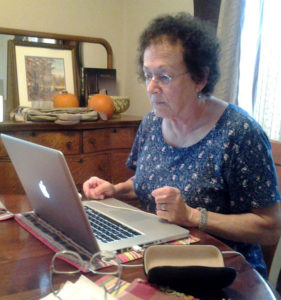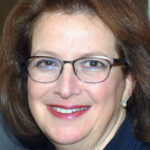
With most major health systems using patient portals for scheduling COVID-19 vaccinations, many older adults may need help setting up accounts. This situation is considered especially true for those older people with lower incomes and education levels, according to data from the National Poll on Healthy Aging at the University of Michigan Institute for Healthcare Policy and Innovation.
The poll finds that 45% of adults aged 65 to 80, and 42% of all adults aged 50 to 80, said they had not set up an account with their health provider’s portal system.
These percentages actually are a slight improvement over responses since the poll was last conducted in March 2018, but more needs to be done, says Preeti Malani, M.D., director of the survey and an infectious disease physician at Michigan Medicine,
“Right now, one important thing that we can do for older adults is encourage and help them to sign up for patient portal access, or log in again if they haven’t in a while if their provider offers one — and especially if it will be used as part of the COVID-19 vaccination process,” Malani said in a statement. “If they don’t have a computer or they need help navigating the technology, they can appoint a trusted adult as their proxy to access their account.”
Disparities among those most affected by the pandemic
The new analysis shows wide gaps in-patient portal use among various groups of older adults — with lower use by some of those who have the highest risk of a severe case of COVID-19 if they aren’t vaccinated.
Just under 50% of Black older adults and 53% of Hispanic older adults lacked an account as of June 2020, compared with 39% of white older adults. Men were less likely than women to have signed up, although that gap has narrowed since 2018.
People 65 to 80 were less likely to have a patient portal account than 50 to 64-year-olds. However, use among both age groups has grown in the past two years. The most significant gap was between adults with annual household incomes less than $60,000 a year and those with higher incomes. About 54% of the lower-income older adults did not have a patient portal account, where only 35% of higher-income older adults lacked an account.
Education level mattered as well, with 53% of those with less than a high school education lacking a patient portal account compared with 31% of college graduates.
Vaccination notification and self-scheduling
As vaccine supply becomes more available, many public health authorities are encouraging older adults to schedule vaccination appointments with the health system where their primary or specialist physician practices.
“Vaccination is so critical to protect their health, and we don’t want technology to stand in their way,” Malani said.
The polls were carried out online in a national sample of more than 2,000 adults aged 50 to 80. Laptops and internet access were provided to poll respondents who did not have them.
Like many major health systems, Michigan Medicine has begun notifying patients over 65 who have an online portal account. They will be notified when it’s their turn to schedule a vaccination appointment. Patients without portal accounts will receive emails, mailed letters or both, inviting them to schedule by phone if necessary.
Malani pointed out that health systems may not make vaccination appointments available until they have the vaccine on hand. Delivery delays have slowed the start of patient vaccination in many areas.
Barriers and opportunities
In the 2018 poll, older adults cited a lack of awareness, lack of need, lack of comfort using the technology, and dislike of communicating about their health online as reasons for not setting up a portal account. Even then, only 26% said their health care provider didn’t offer a patient portal. As more physicians become affiliated with large health systems that provide a central portal system as part of their electronic medical record systems, older adults will likely have increased availability to this service.
Of course, arranging a COVID-19 vaccination is just one reason that patient portal access can help older adults better manage their health. Among adults who had set up a patient portal account by the 2018 poll, the most common use was to see test results (84%). Other common uses included requesting a prescription refill (43%), scheduling an appointment (37%), requesting reminders about upcoming appointments (34%), getting advice about a health problem (26%), updating insurance or contact information (22%), and requesting a referral (13%).
Patient portals have also become increasingly useful for enabling telemedicine visits, which have become more important for managing chronic conditions during the pandemic. However, as this KFF article points out, issues surrounding education, income, language barriers and comfort level with technology mean older adults do not take advantage of smartphone or Internet capabilities as much as middle-aged and younger people. This JAMA study published in August 2020 estimated how many older people might be left behind as more providers and health systems switch to telemedicine.
The newly analyzed data come from a poll question asked in June 2020, soon after a rapid shift to telemedicine by many health systems amid the pandemic.
In August 2020, using data from that same poll, the National Poll on Healthy Aging reported that 26% of older adults had participated in at least one telehealth visit between March and June. This compares with just 4% who had ever had a telemedicine visit when the poll last asked about this topic in May 2019. Michigan Medicine, the University of Michigan’s academic medical center, supported the poll, along with AARP.
Journalists may want to speak with older adults to gauge their comfort level in making appointments through a patient portal. Are they comfortable taking on this task or are they asking for help from family or friends?
Locations as diverse as Miami-Dade County, the state of Connecticut, Bergen County, N.J. and Bremerton, Wash. have all reported technical and logistical glitches with booking vaccination appointments. What’s being done in your community to help older people who may have education, access, language or other barriers to making appointments or traveling to sites to receive a vaccine?








